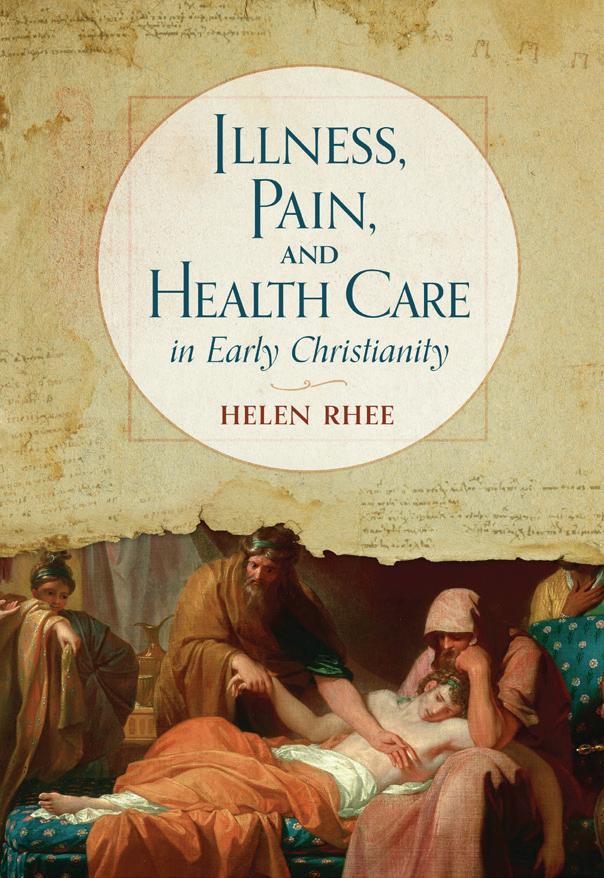
19 minute read
New Testament Early Christianity


Advertisement
Helen Rhee What did pain and illness mean to early Christians? And how did their approaches to health care compare to those of the ancient Greco-Roman world?
In this wide-ranging interdisciplinary study, Helen Rhee examines the ways that early Christians viewed illness, pain, and health care—and how they were in uenced both by their own tradition and by the milieu of the larger ancient world. roughout the book, Rhee places the history of medicine, Greco-Roman literature, and ancient philosophy in fruitful dialogue with early Christian literature and theology to show the nuanced ways Christians understood, appropriated, and reformulated Roman and Byzantine conceptions of health and wholeness from the second through sixth centuries CE.
Utilizing the contemporary eld of medical anthropology, Rhee engages illness, pain, and health care as sociocultural ma ers. rough this and other methodologies, she explores the theological meanings a ributed to illness and pain; the religious status of those su ering from these and other a ictions; and the methods, systems, and rituals that Christian individuals, churches, and monasteries devised to care for those who su ered. Rhee’s ndings ultimately provide an illuminating glimpse into an instrumental way that Christians began shaping a distinct identity—both as part of and apart from their Greco-Roman world.
Helen Rhee is professor of the history of Christianity at Westmont College. She is the author of Wealth and Poverty in Early Christianity; Loving the Poor, Saving the Rich: Wealth, Poverty, and Early Christian Formation; and Early Christian Literature: Christ and Culture in the Second and ird Centuries. Rhee is also the ordained minister at Free Methodist Church of Santa Barbara, California.
978-0-8028-7684-3 • Jacketed Hardcover • 360 pages • $49.99 US • $66.99 CAN • £40.99 UK
AVAILABLE OCTOBER 2022
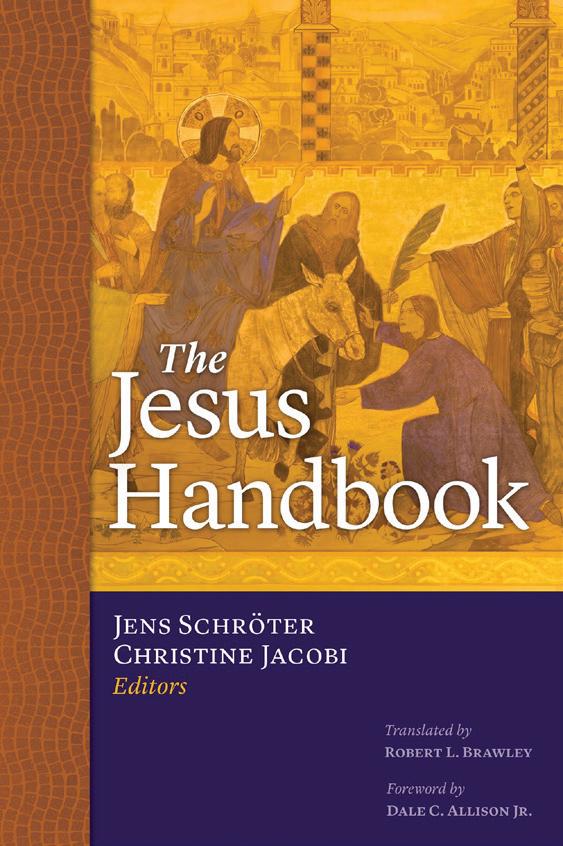
The Jesus Handbook
Edited by Jens Schröter and Christine Jacobi
Translated by Robert L. Brawley Foreword by Dale C. Allison Jr. An authoritative collection of rst-rate scholarship on Jesus, his world, the outcomes of his life, and the quest to locate him in history.
e Jesus Handbook is an indispensable reference work featuring essays from a team of renowned international scholars on the signi cance and meaning of the life of Jesus of Nazareth. Rooted in historical-critical methodology, it emphasizes a diversity of perspectives and provides a spectrum of possible interpretations rather than a single uni ed portrait of Jesus. A er an introduction that lays out the considerations of the task at hand, the authors survey the history of Jesus research and take a close look at the historical material itself—textual and otherwise. From this foundation, the Handbook then details the life of Jesus as best it can be known, before at last exploring the reception and e ects of Jesus’s life a er his death, especially in the rst centuries CE.
CONTRIBUTORS
Sven-Olav Back, Knut Backhaus, Reinhard von Bendemann, Albrecht Beutel, Darrell L. Bock, Martina Böhm, Cilliers Breytenbach, James G. Crossley, Lutz Doering, Martin Ebner, Craig Evans, Jörg Frey, Yair Furstenberg, Christine Gerber, Katharina Heyden, Friedrich Wilhelm Horn, Stephen Hultgren, Christine Jacobi, Jeremiah J. Johnston, omas Kazen, Chris Keith, John S. Kloppenborg, Bernd Kollmann, Michael Labahn, Hermut Löhr, Tobias Nicklas, Markus Öhler, Martin Ohst, Karl-Heinrich Ostmeyer, James Carleton Paget, Rachel Schär, Eckart David Schmidt, Daniel R. Schwartz, Markus Tiwald, David du Toit, Joseph Verheyden, Samuel Vollenweider, Ulrich Volp, Anne e Weissenrieder, Michael Wolter, Jürgen K. Zangenberg, Christiane Zimmermann, and Ruben Zimmermann.
Jens Schröter is professor of New Testament and ancient Christian apocrypha at Humboldt University of Berlin. Christine Jacobi is visiting professor of New Testament and ancient Christian apocrypha at Humboldt University of Berlin.
978-0-8028-7692-8 • Jacketed Hardcover • 720 pages • $74.99 US • $100.99 CAN • £60.99 UK
AVAILABLE NOVEMBER 2022


NEW TESTAMENT & EARLY CHRISTIANITY Paul, Then and Now

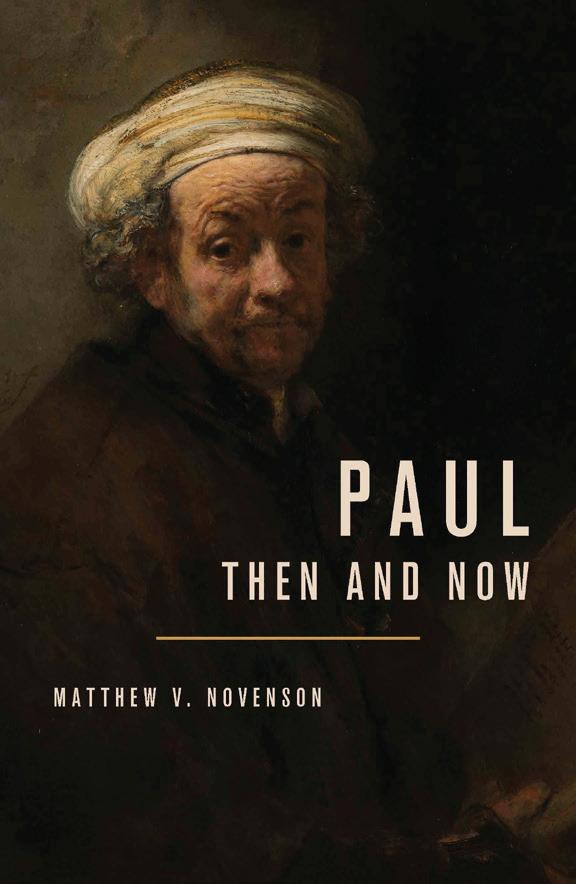
Ma hew V. Novenson
Ma hew Novenson has become a leading voice advocating for the continuing relevance of historical-critical readings of Paul even as some New Testament scholars have turned to purely theological or political approaches. In this collection of a decade’s worth of essays, Novenson puts contextual understandings of Paul’s le ers into conversation with their Christian reception history, reckoning with the hermeneutical struggle to make sense of Paul as both a historical gure and a canonical muse.
“Ma hew Novenson has emerged as a leading Pauline scholar, and this ne collection of his essays indicates why. rough careful analysis of the sources, he insists on placing Paul honestly in the historical past, in all its strangeness om our point of view. But he has also thought deeply and clearly about the hermeneutical responsibility we undertake if we wish to activate Paul’s voice today. Lively, provocative, and self-aware, these essays are a rich resource for all who study Paul.”
— JOHN M. G. BARCLAY
Durham University
“ is ne collection of essays takes up a number of important issues in Pauline studies and displays at every turn Ma hew Novenson’s remarkable capacity for astute questions and gracious engagement with the work of others. e results are insightful and instructive. is is must-reading for Pauline specialists.”
— BEVERLY ROBERTS GAVENTA
Princeton Theological Seminary
“In this very interesting book, Novenson pursues his primary interest in the original historical situations of the Pauline le ers and their meaning in those contexts. At the same time, he studies other, later readings to clarify the di erences between them and what the apostle was up to. is is a fascinating and original approach, and its uits are worth considering seriously.”
— ADELA YARBRO COLLINS
Yale Divinity School
Ma hew V. Novenson is senior lecturer in New Testament and Christian origins at the University of Edinburgh, where he is also director of the Centre for the Study of Christian Origins. He is the author of Christ among the Messiahs: Christ Language in Paul and Messiah Language in Ancient Judaism and e Grammar of Messianism: An Ancient Jewish Political Idiom and Its Users and editor of Monotheism and Christology in Greco-Roman Antiquity.
978-0-8028-8171-7 • Jacketed Hardcover • 264 pages • $44.00 US • $58.99 CAN • £35.99 UK
AVAILABLE NOW
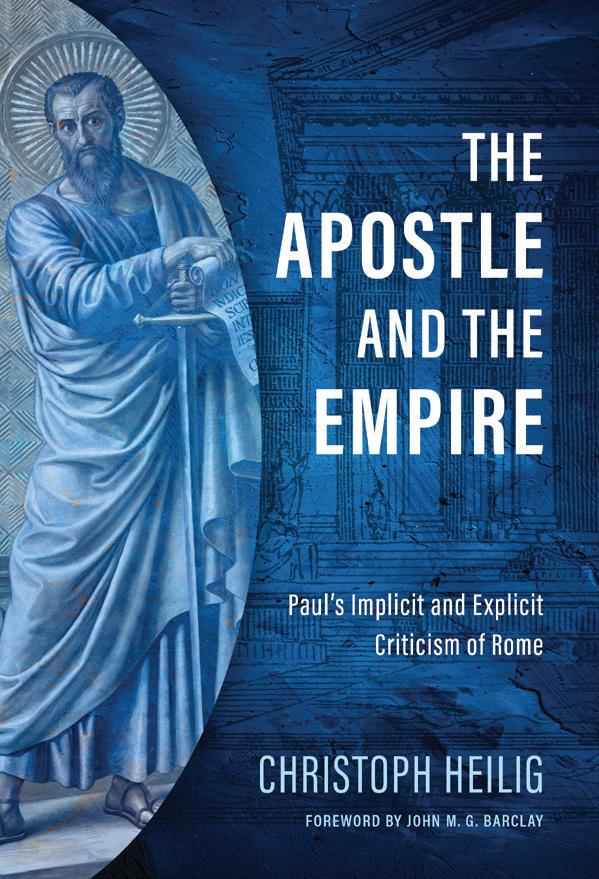
The Apostle and the Empire
Paul’s Implicit and Explicit Criticism of Rome Christoph Heilig
Foreword by John M. G. Barclay Was Paul silent on the injustices of the Roman Empire? Or have his le ers just been misread?
e existence of anti-imperial rhetoric in the writing of the apostle Paul has come under greater scrutiny in recent years. Pressing questions about just how much Paul actually addressed Rome in his le ers and how publicly critical he could have a orded to be have led to high-pro le debates—most notably between N. T. Wright and John M. G. Barclay.
A er having entered the conversation in 2015 with his book Hidden Criticism?, Christoph Heilig contributes further insight and new research in e Apostle and the Empire to argue that the case for Paul hiding his criticism of Rome in the subtext of his le ers has more merit than previously claimed by scholars like Barclay. Moreover, he argues that there are also passages that contain more open denouncements of the Roman Empire that scholars have previously overlooked—for instance, in the mention of a “triumphal procession” in 2 Corinthians, which Heilig discusses in great detail by drawing on a variety of archaeological data.
Heilig’s groundbreaking work constitutes a must-read for Pauline scholars but also for anyone interested in the intersection of Christianity and empire and how one of the Christian tradition’s most important teachers communicated his unease with the global superpower of his day. Furthermore, Heilig takes on larger issues of theory and methodology in biblical studies, raising signi cant questions about how interpreters can move beyond outdated methods of reading the New Testament toward more robust understandings of the ways ancient texts convey meaning.
Christoph Heilig is a postdoctoral researcher at the University of Basel, Switzerland. He has studied theology and biblical studies in Germany and Scotland and received a doctorate from the University of Zurich. His other publications include Paul’s Triumph: Reassessing 2 Corinthians 2:14 in Its Literary and Historical Context, Hidden Criticism? e Methodology and Plausibility of the Search for a Counter-Imperial Subtext in Paul, and God and the Faithfulness of Paul, which he coedited with J. omas Hewi and Michael F. Bird.
978-0-8028-8223-3 • Jacketed Hardcover • 208 pages • $29.99 US • $39.99 CAN • £23.99 UK
AVAILABLE NOVEMBER 2022
Reading Paul Jonathan A. Linebaugh
Foreword by John M. G. Barclay A collection of exegetical, historical, and theological essays on Paul’s le ers, including reception history and comparative readings in conversation with other texts.
is collection of Jonathan Linebaugh’s most important work on Paul explores the merciful surprise at the heart of Paul’s gospel: a grace that, while strange and weak in worldly terms, is nothing less than the power of God, full of comfort and promise. rough twelve essays—two of them new—Linebaugh contextualizes and interprets key Pauline passages, does comparative readings of Paul in conversation with early Jewish texts, and enters into dialogue with Reformation theologians such as Martin Luther and omas Cranmer. orough and multifaceted, Linebaugh’s work is at once exegetical, historical, and theological in scope. Accordingly, e Word of the Cross is a rigorous scholarly enterprise that takes seriously Paul’s claim that the good news of Jesus Christ, despite appearing scandalous and foolish, in fact contradicts and overcomes the conditions of the possible through the power of God.
“ ose who have read or heard the scholarly work of Jonathan Linebaugh will know his trademark qualities: incisive analysis of texts, arresting turns of phrase, and a deep resonance with the theology of Paul. . . . ere are few people today who can trace the contours of Paul’s theology with such sensitivity or utilize the history of theological interpretation with such creativity, and I am con dent that everyone will come away om reading this book both enriched and provoked to think harder about the theology of Paul.”

— JOHN M. G. BARCLAY
from the foreword
“ ere are books of biblical scholarship that are learned, knowledge- and discussionadvancing, even important. en there are a handful that won’t leave you alone, like a plangent tune or a poem whose images keep needling you: books that are learned but also insightful and humane, wisdom-deepening and conversation-altering; books that are not just important but also vital and enlivening. is is such a book. It is deeply conversant with the best of historic and contemporary Pauline scholarship; it features ground-breaking exegetical, comparative, and reception-historical work; and it is u erly memorable in its summons for scholars—and preachers—to hear a esh the heart of Paul’s good news as it shudders to an end for us at and on the cross.”
— WESLEY HILL
Western Theological Seminary
“Underneath Jonathan Linebaugh’s remarkable gi s as a reader and a writer lies a profound capacity for genuine conversation. Here he places the le ers of Paul in conversation with voices as divergent as the Wisdom of Solomon, omas Cranmer, Miguel de Cervantes, and George Eliot. e results illuminate, instruct, and edify. ose determined to restrict Paul to a corner of the rst century need to stay away om this compelling interpreter, who shows on every page that the word of the cross persists as ‘merciful surprise.’”
— BEVERLY ROBERTS GAVENTA
Princeton Theological Seminary
“An outstanding set of studies that are not just about Paul but esh articulations of Paul’s testimony to God’s revelation in Christ. Linebaugh navigates a remarkable range of literature—ancient, early modern, and contemporary—in the service of elucidating what is ‘of rst importance.’ In short, these essays should be read by anyone interested in Paul.”
— SIMON GATHERCOLE
University of Cambridge
“No ma er how many times you have read Paul’s le ers, this book will teach you something about their purpose. A careful exegete and astute theologian, Jonathan Linebaugh o ers something rare in scholarship. He goes beyond purely historical or linguistic analyses of Paul to convey the essential shape of Paul’s theology. Clearly and o en beautifully wri en, e Word of the Cross gives readers new appreciation for Paul’s answers to profound theological questions.”
— SUSAN E. HYLEN 978-0-8028-8167-0 • Jacketed Hardcover • 292 pages • $45.00 US • $60.99 CAN £36.99 UK • AVAILABLE NOW


Jonathan A. Linebaugh is associate professor of New Testament theology at the University of Cambridge and a fellow of Jesus College, Cambridge. He is the author of God, Grace, and Righteousness in Wisdom of Solomon and Paul’s Le er to the Romans; editor of God’s Two Words: Law and Gospel in the Lutheran and Reformed Traditions; and the coeditor, with Michael Allen, of Reformation Readings of Paul: Explorations in History and Exegesis.
“ is is a passionate and erudite exposition of Paul’s gospel. Biblical scholars and theologians will nd brilliant exegesis that is deeply engaged both with Paul’s rst-century Jewish context and with the history of interpretation. at alone makes this book well worth reading. But there is so much more. For those who long to hear the clarion call of Paul’s good news, here is hope in the midst of despair, courage for the faithless, the surprise of God’s scandalous grace for all—in short, the word of the cross.”
— SUSAN EASTMAN
Duke Divinity School
RELATED TITLES
God’s Two Words
Law and Gospel in the Lutheran and Reformed Traditions Jonathan A. Linebaugh 978-0-8028-7475-7 Reading Paul with the Reformers
Reconciling Old and New Perspectives Stephen J. Chester 978-0-8028-4836-9 Paul and the Gift
John M. G. Barclay 978-0-8028-7532-7

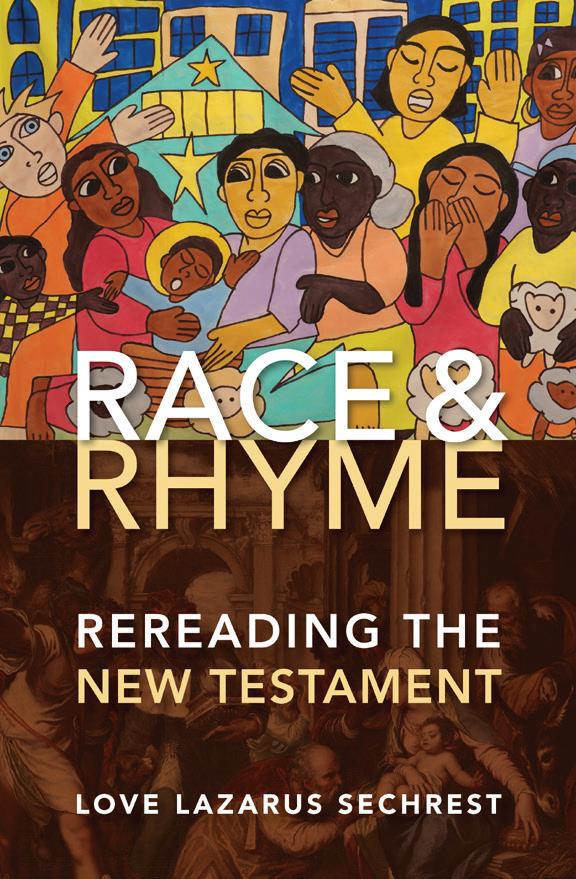
Race and Rhyme
Rereading the New Testament Love Lazarus Sechrest A leading womanist biblical scholar reads passages om the New Testament in dialogue with modern-day issues of racial justice.
In Race and Rhyme, Love Sechrest utilizes her cultural experience and her perspective as a Black woman interpreter to draw out resonances between select New Testament passages and contemporary topics such as antiracist allyship, cultural assimilation, gendered stereotypes, the experience of Black women and girls in the American criminal justice system, group identity, privilege, coalition-building among diverse groups, and government’s role in providing social welfare. rough these creative and illuminating connections, Sechrest o ers a rich bounty of new insights from Scripture—drawing out ma ers of justice and human dignity that spoke to early Christians and can speak still to Christians willing to listen today. Topics explored include: • antiracist allyship and Jesus’s interaction with marginalized individuals in the Gospel of Ma hew • cultural assimilation and Jesus’s teachings about family and acceptance in the Gospel of Luke • gendered stereotypes and the story of the Samaritan woman in the Gospel of John • the experience of Black women and girls in the American criminal justice system and the woman accused of adultery in the Gospel of John • group identity and the incorporation of Gentiles into the early Jesus movement in Acts
• privilege and Paul’s claims to apostolic authority in 2 Corinthians
• coalition-building between diverse groups and the discussion of unity in Ephesians • government’s role in providing social welfare and early Christians’ relation ship to the Roman Empire in Romans and Revelation
Love Lazarus Sechrest is vice president for academic a airs, dean of faculty, and associate professor of New Testament at Columbia eological Seminary. She is the author of A Former Jew: Paul and the Dialectics of Race and Can “White” People Be Saved? Triangulating Race, eology, and Mission.
978-0-8028-6713-1 • Jacketed Hardcover • 400 pages • $39.99 US • $53.99 CAN • £32.99 UK
AVAILABLE AUGUST 2022
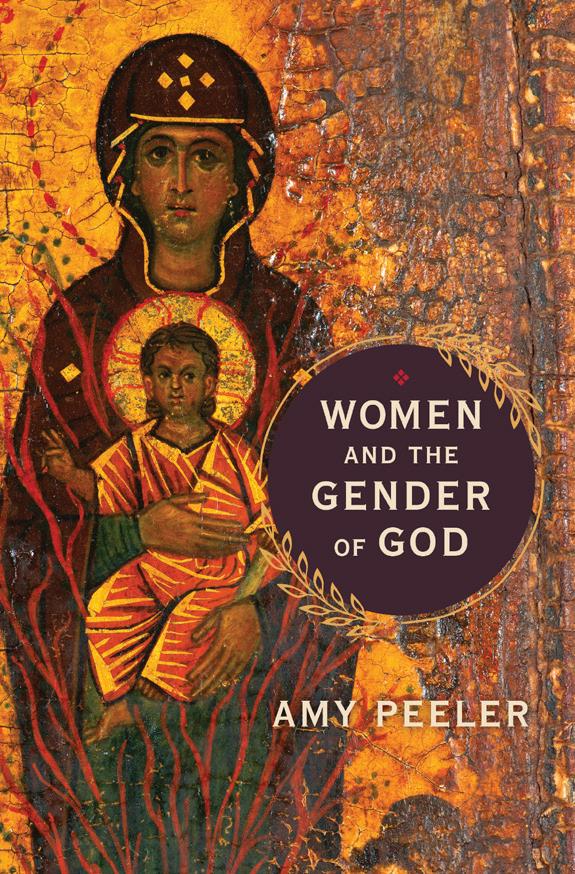
Women and the Gender of God
Amy Peeler A theological argument against the misogynistic heresy that God is male and an a rmation of the truth that God values women, supported by a deep reading of the New Testament incarnation narratives and other relevant biblical texts.
God values women.
While many Christians would readily a rm this truth, the widely held assumption that the Bible depicts a male God persists—as it has for centuries. is misperception of Christianity not only perniciously implies that men deserve an elevated place over women but also compromises the glory of God by making God appear to be part of creation, subject to it and its categories, rather than in transcendence of it. rough a deep reading of the incarnation narratives of the New Testament and other relevant scriptural texts, Amy Peeler shows how the Bible depicts a God beyond gender and a savior who, while embodied as a man, is the uni cation in one person of the image of God that resides in both male and female. Peeler begins with a study of Mary and her response to the annunciation, through which it becomes clear that God empowers women and honors their agency. en Peeler describes from a theological standpoint how the virgin birth of Jesus—the second Adam—reverses the gendered division enacted in the garden of Eden.
While acknowledging the signi cance of the Bible’s frequent use of “Father” language to represent God as a caring parent, Peeler goes beneath the surface of this metaphor to show how God is never sexualized by biblical writers or described as being physically involved in procreation—making the concept of a masculine God dubious, at best. From these doctrinal centers of Christianity, Peeler leads the way in reasserting the value of women in the church and prophetically speaking out against the destructive idolatry of masculinity.
Amy Peeler is associate professor of New Testament at Wheaton College and associate rector at St. Mark’s Episcopal Church in Geneva, Illinois. She is the author of You Are My Son: e Family of God in the Epistle to the Hebrews and the coauthor, with Patrick Gray, of Hebrews: An Introduction and Study Guide.
978-0-8028-7909-7 • Paperback • 300 pages • $24.99 US • $33.99 CAN • £19.99 UK
AVAILABLE OCTOBER 2022


What Is a Gospel?
Francis Watson e compelling case for viewing early gospel literature as a uni ed genre that transcends conventional categories of canonical, noncanonical, and heretical.
“In Gospel Writing Francis Watson brought us a deeply impressive work that has been described by reviewers as everything om ‘energetic’ and ‘wide-ranging’ to ‘brilliant’ and ‘breath-taking.’ Now we have its sequel, What Is a Gospel? And once again Watson’s impressive facility with the wider corpus of ancient Christian texts, his integrative creativity, and his sensitivity to meta-questions sparkle. Readers are in for some surprises relating to the ‘quest’ for the historical Jesus, the death of Judas, the currency of patristic consensuses, and much more besides. is is a book to celebrate!” — CHRIS TILLING
St. Mellitus College
“What happens when the ‘gospel genre’ is opened to an eclectic array of literary products ascribed to apostles (or their close associates) that focus on Jesus and his authoritative role—and when study of that literature is approached om historical and hermeneutical perspectives on ongoing processes of gospel traditioning, writing, and rewriting? is wide-ranging collection of essays, comprising a sequel to Francis Watson’s iconoclastic Gospel Writing, provocatively poses and responds to this question in ways that are sure to encourage, and shape, further discussion.”

— JOEL B. GREEN
Fuller Theological Seminary
“ is insightful and engaging monograph represents a much-welcomed challenge to the eld. Watson takes li le for granted and presents new points of departure in our analyses of ‘gospels’ both within and outside of the canon. Systematic, sharp, and bold in its conclusions, What Is a Gospel? will foster debate while remaining a rich resource for generations to come.” — ROBYN FAITH WALSH
University of Miami
“Provocative, original, and elegantly wri en, What Is a Gospel? is a wide-ranging contribution to scholarly discussion about canonical and non-canonical gospels. It is full of new insights on old questions across the whole eld of early Christian gospels. Vintage Watson!”
— SIMON GATHERCOLE
University of Cambridge
Francis Watson is professor of New Testament at Durham University, England. His other books include Gospel Writing: A Canonical Perspective and e Fourfold Gospel: A eological Reading of the New Testament Portraits of Jesus.
978-0-8028-7292-0 • Jacketed Hardcover • 353 pages • $49.00 US • $65.99 CAN • £39.99 UK
AVAILABLE NOW

The Gospel and the Gospels
Christian Proclamation and Early Jesus Books Simon Gathercole A robust scholarly defense of the distinctiveness of the canonical Gospels.
Is there anything that makes the four New Testament Gospels di erent from other early Christian Gospels? e tendency among biblical scholars of late has been to declare the answer to this question no—that the Gospels of Matthew, Mark, Luke, and John were grouped together by happenstance and are defended as canonical today despite there being no essential commonalities between them.
Simon Gathercole challenges this prevailing view and argues that there are in fact substantial di erences of theological content between the New Testament Gospels and noncanonical Gospels. Gathercole shows how the Gospels of Ma hew, Mark, Luke, and John each include four key points that also formed the core of early Christian preaching and teaching: Jesus’s identity as messiah, the saving death of Jesus, the resurrection of Jesus, and Scripture’s foretelling of the Christ event. In contrast, most noncanonical Gospels—like the Gospel of omas, the Gospel of Truth, and Marcion’s Gospel—only selectively appropriated these central concerns of early Christian proclamation.
“ is is a book with a bold thesis. It argues that the four Gospels of the New Testament—Ma hew, Mark, Luke, and John—are theologically distinctive om other early Christian Gospels in that they alone present the full message of Jesus’s teaching, death, and resurrection, which are elements that are understood to be central to salvation. e case is prosecuted with great care, and all the relevant sources are meticulous si ed. e book’s argument will be hotly debated, and it must be read by anybody with a serious interest in the gospels and the message of Jesus.”
— PAUL FOSTER
University of Edinburgh
Simon Gathercole is professor of New Testament and early Christianity at the University of Cambridge, where he is also the director of studies in theology at Fitzwilliam College. He is editor of New Testament Studies, coeditor of Early Christianity, and a contributor to numerous publications, including Christianity Today and the Guardian. His other books include e Preexistent Son: Recovering the Christologies of Ma hew, Mark, and Luke; What Did the Cross Accomplish? A Conversation about the Atonement, which he coauthored with N. T. Wright and Robert B. Stewart; and a translation of the apocryphal gospels for Penguin Classics.
978-0-8028-7759-8 • Jacketed Hardcover • 608 pages • $55.99 US • $75.99 CAN • £45.99 UK










